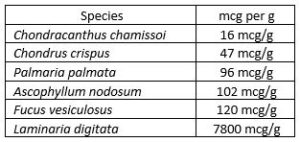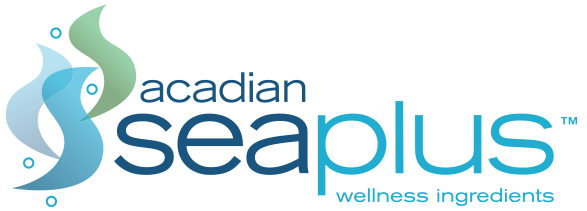Low sodium diets? Health officials think this change in U.S. eating habits is long overdue.
Studies show the average daily sodium intake for an adult in the U.S. is 3,608 mg compared to the 2,300 mg recommended by the Department of Health & Human Services. Our fast-paced modern lives make cutting back on sodium tough—thank you prepackaged and fast foods—but those who do cut back see long-term heart health benefits.
While limiting our salt intake is generally positive, one unintended side effect might crop up: iodine deficiencies. All the iodized salt people consume has the benefit of keeping this trace mineral in ample supply. The good news is the right seaweed supplements allows people to avoid high sodium diets and still get the following iodine health benefits.
Maintain a Healthy Metabolism
The ability of the human body to convert food into energy depends on an efficient metabolism, which in turn relies upon proper amounts of iodine. A thyroid gland with enough of this trace mineral can produce essential hormones that help burn body fat, regulate temperatures, repair cells, and sustain a typical basal metabolic rate (BMR).
When there’s not enough iodine in their systems, people can feel fatigued or weakened as well as having issues with keeping warm and maintaining their memory and concentration. This often manifests itself as hypothyroidism.
Prevent Goiters
When the human body lacks enough iodine, all the above internal functions can suffer, but people can also see an outward appearance of these symptoms. Iodine deficiencies can cause irregular growth of the thyroid gland, which results in swollen lumps at the base of the neck.
Though not life-threatening (unless the cause is thyroid cancer), this condition can make people feel self-conscious in addition to any underlying health issues.
Support Healthy Pregnancies
Pregnant mothers are particularly in need of the right amount of iodine. Deficiencies of this trace mineral can lead to issues with the normal cognitive development of babies during gestation up until 18 months of age.
Studies have shown that iodine deficiencies can have many irreversible effects on infants from severe learning disabilities and psychomotor impairment to pregnancy loss and infant mortality. Because nutritional needs increase during pregnancy and neonatal care, pregnant women need to make sure they’re getting enough iodine (as well as folic acid, iron and vitamin D) to keep infants healthy and safe. Each person and situation is unique however, so if you are pregnant or may become pregnant, please consult your physician or healthcare practitioner.
How Does Seaweed Help?
The good news is that a little goes a long way when it comes to iodine. Here’s all you need to maintain healthy levels of this micronutrient, according to the Harvard School of Public Health and the Dietary Guidelines for Americans 2020 – 2025:
- Average Adult: 150 mcg
- Pregnant Women: 220 mcg
- Lactating Women: 290 mcg
For this reason, seaweed is an excellent source of iodine to include in nutritional supplements. Though different species of seaweed will have different levels of iodine, most provide ample amounts for consumers’ dietary needs.
Research shows that seaweed species can vary greatly in the amount of available iodine.

The seaweed you choose to use for iodine supplements will depend on availability and seasonality, but no matter your needs, Acadian SeaPlus™ has marine resources that can help consumers keep sodium levels low and iodine health benefits at their fullest.
Are you looking to boost the seaweed iodine content in your health supplements? Acadian SeaPlus™ can provide you with the right species for your product needs.
Learn about our seaweed
Related Articles
Acadian SeaPlus™ Releases New Chondracanthus chamissoi Seaweed Product to Global Markets
The Brown Seaweed Supplement Benefits That Boost Your Gut Health, Mental Health and More
